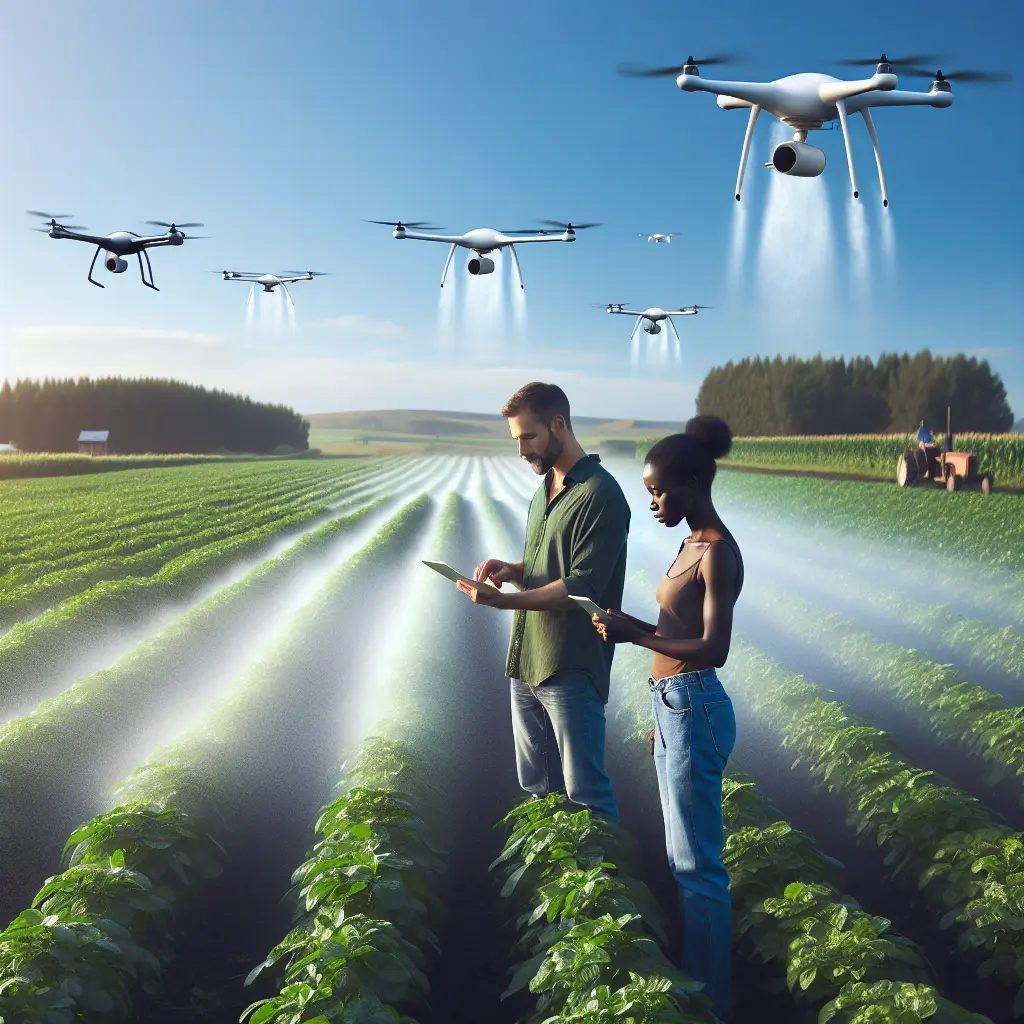
Transforming Agriculture with Drone Technology
In the ever-evolving landscape of modern agriculture, technological advancements are playing a pivotal role in enhancing productivity and sustainability. Among these innovations, drones have emerged as game-changers, offering cutting-edge solutions for irrigation optimization and precision agriculture. As water resources become increasingly scarce, efficient water use in agriculture becomes essential. Drone technology steps in to provide smart irrigation systems that conserve water while boosting crop yields.
In response to global challenges such as climate change and food security, the agricultural sector is adopting innovative solutions like drones for irrigation optimization. Recent technological advancements position drones as vital tools in precision agriculture, promoting sustainable farming practices. This section explores how drones revolutionize water management in farming, highlighting recent updates and developments.
Revolutionizing Water Management with Agricultural Drones
Equipped with cutting-edge technology, agricultural drones have become indispensable in modern farming. These UAVs offer various functionalities that enhance water use efficiency and crop yields. By utilizing remote sensing, drones provide real-time data that aids farmers in monitoring crop health and soil moisture levels effectively.
A notable initiative is the SERVIR Science Coordination Office's collaboration with Bhutan’s partners to launch the Farm Action Toolkit Service. This effort aims to increase Earth observation capacity, providing farmers with critical data for irrigation optimization, demonstrating a global commitment to integrating advanced irrigation techniques.
Drones equipped with sensors can precisely detect areas requiring irrigation, ensuring water is applied where needed. This targeted approach conserves water while boosting crop health, aligning with sustainable farming practices.
Harnessing AI and Drones for Precision Agriculture
Artificial Intelligence (AI) enhances drone capabilities for smart irrigation systems. Integrating AI applications in farming allows drones to analyze vast amounts of data and make predictive decisions about irrigation schedules and water needs. This synergy between AI and drone technology paves the way for more efficient water management practices.
For instance, AI-driven predictive analytics can forecast weather patterns and soil moisture levels, enabling drones to adjust irrigation schedules dynamically. This advancement is crucial as the agricultural sector tackles challenges like hunger and climate change.
AI's role in combating climate change is significant, as experts assert its importance in ushering sustainable farming practices that address food security and environmental concerns. By leveraging AI, agricultural drones contribute substantially to efficient water use.
Case Study: Drones Reducing Methane Emissions
A less-discussed benefit of drone-based irrigation management is its potential to reduce methane emissions, a key driver of climate change. While methane is often associated with livestock emissions, its role in agriculture is gaining attention. Optimizing irrigation practices with drones helps minimize waterlogged conditions that increase methane production.
This connection between efficient water management and methane reduction underscores the broader environmental impact of drones in agriculture. As stakeholders address climate challenges, integrating drone irrigation solutions offers a promising approach to reducing agricultural methane emissions.
Global Innovations and Future Prospects
Globally, the adoption of drones for irrigation optimization is gaining momentum. Events like the Goodwood Festival of Speed 2024's Future Lab showcase groundbreaking technologies shaping farming's future. These platforms highlight how drones and other innovations redefine traditional agricultural practices.
Furthermore, the electrification of ports and advancements in freight logistics are transforming agricultural supply chains. As ports become more competitive through electrification, efficiency gains extend to agricultural exports, underscoring the interconnectedness of technological advancements across industries.
The Path Forward: Embracing Sustainable Farming Practices
Navigating modern agriculture complexities reveals that embracing drone technology is crucial for sustainable farming practices. Optimizing irrigation schedules and promoting efficient water use set new standards for environmental stewardship.
Farmers and agricultural professionals must stay informed about these advancements and consider integrating drones into their operations. As we look to the future, the potential of drones in agriculture remains vast, promising to reshape irrigation practices and contribute to global sustainability goals.
Conclusion
The integration of drones into agricultural practices revolutionizes the industry by optimizing irrigation methods. These advanced tools enable precision agriculture by offering real-time data on crop health and soil moisture levels, enhancing water use efficiency and boosting crop yields. Collaborations like the SERVIR Science Coordination Office's Farm Action Toolkit Service provide farmers worldwide access to critical data, demonstrating a global commitment to modernizing agricultural practices.
Drones, synergized with Artificial Intelligence, dynamically manage irrigation schedules by predicting weather patterns and soil moisture needs. This innovative approach addresses food security while contributing to environmental sustainability by mitigating climate change impacts. A key environmental benefit highlighted is reducing methane emissions through improved water management, reflecting the broader ecological role drones can play in agriculture.
Globally, momentum for adopting drone technology in farming is building. Events like the Goodwood Festival of Speed 2024's Future Lab spotlight these advancements, indicating a promising future for precision farming technologies. Moreover, the interconnectedness of technological advancements across industries complements the agricultural sector by enhancing supply chain efficiencies.
As the agricultural landscape continues evolving, embracing drone technology is pivotal for sustainable farming practices. Farmers and agricultural professionals are encouraged to stay informed and consider integrating these innovations into their operations to ensure a more resilient agricultural future.
In closing, the transformative power of drones in agriculture sets new standards for environmental stewardship and productivity. By continuing to explore and implement these technologies, we can pave the way for a more sustainable and efficient agricultural landscape. We invite you to share your insights and experiences with drone technology in agriculture. How have these innovations impacted your farming practices? Your feedback can contribute to a broader dialogue on sustainable agriculture.
Thank you for joining us on this journey towards a more innovative and sustainable future in farming.
Author: Ethan Maxwell